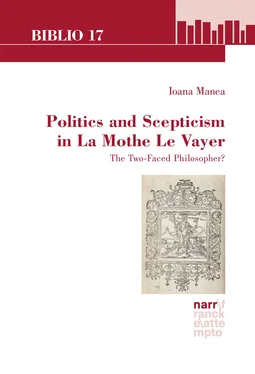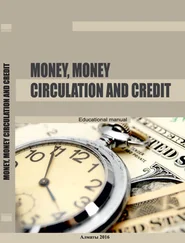Nous croyons que rien ne se fait en matière d’État, que par des conseils plus aisés à respecter qu’à pénétrer, et que toutes choses y sont portées à leurs fins de long temps prévues, et quasi infaillibles ; là où vous pouvez tenir pour très sûr que, comme le vent d’un chapeau est capable de détourner le plus grand coup de foudre, souvent aussi un respect de nulle considération, un intérêt très léger et particulier, un moment nullement prémédité hâte ou recule, fait ou défait les plus importantes actions d’un Louvre ; quoique toujours prétextées de causes très élevées et de motifs très spécieux.8
The thoughts that give substance to the rulers’ judgements rely neither on subtle and long time nurtured reflections, nor on reasons that are at the height of their often major influence on people’s lives. Unlike the profound reasons that are attributed to them, political decisions are often taken on the spot and can derive from causes that are insignificant in comparison with the effects that they trigger. For instance, despite what the very young Louis XIII thought, his 1620 expedition to the Béarn, which “has been followed by the most remarkable changes that have been seen in France over the last five hundred years” (“a été suivi[e] des plus notables changements qui se soient vus en France depuis cinq cents ans”), was, in fact, brought about by the desire of the Duke of Luynes to remove from the Court the Marquis de Montpouillan, whose influence he feared.9 Hence, the reasons that sometimes determine even the most extraordinary actions of rulers do not result from a rigorous examination of the situation, but from passions that are by definition irrational. Unlike the leaders, ordinary individuals, who are used to facing the hostility of fate or of their fellows know better the limits of their capacities to act and show themselves wiser in the preparation of their actions: “there being maybe none of us who, while running his small family, wanted to yield so much either to his passions, or to fortune, as are doing daily all these great State guardians while governing their kingdoms” (“n’y ayant peut-être aucun de nous qui en la conduite de sa petite famille voulût avoir tant donné à ses passions ni à la fortune, comme font tous les jours ces grands tuteurs des États dans le gouvernement des seigneuries”).10
Despite their arrogance and the exceptional qualities attributed to them by their subjects, rulers possess a knowledge that actually amounts to “I do not know what cabinet routine” (“je ne sais quelle routine de cabinets”) and “I do not know what State chicanery” (“je ne sais quelle chicane d’État”).11 The political know-how, which is without doubt possessed by the leaders, is foreign to the theoretical thought that is appropriate to sciences and that is based on accurately elaborated principles:
For it happens daily that in the context of a kingdom disarray excellent negotiations will be conducted by people who, except for a certain understanding of persons, and some negotiation routine that they have achieved in time, can only be said to be individuals of very poor talent and of small or no significance at all. Just like in the game of cards, wherein there are people who know tricks and ways of deceitfully shuffling them, although they do not have a good understanding of the game and are obviously witless with respect to it.
Car il arrive tous les jours que des hommes négocieront excellemment parmi les confusions d’une Seigneurie, lesquels hors de certaines intelligences qu’ils ont des personnes, et de quelque routine de négociation qu’ils ont acquise par le temps, ne peuvent passer que pour personnes de très médiocre talent, et de petite ou nulle considération. De même qu’au jeu de cartes, il y en a qui y savent de piperies, et des façons de les brouiller trompeusement, bien qu’ils n’entendent guère bien les jeux, et qu’ils y soient manifestement impertinents.12
Far from being the result of a speculative intelligence, the supposedly noble knowledge thanks to which politicians exert their power consists in a habit acquired through practice and small-scale swindle. That is why political science can actually be considered a mere “resourcefulness” (“débrouillardise”),13 unable to dominate the reality it claims to govern or to ensure the success of those who are using it.
By covering in mystery the reasons of their actions, leaders act similarly to the divinity, which seems to be willing to keep the secret around the strings that it pulls in order to run the theatre of the world. Nevertheless, the only true mystery that the people in power possess is that they are unable to exert a deep influence on the political stage. Far from fulfilling the noble function of stage directors, they are simple actors in a play whose script they ignore and whose plot progress they find out almost at the same time as their subjects.
Конец ознакомительного фрагмента.
Текст предоставлен ООО «ЛитРес».
Прочитайте эту книгу целиком, купив полную легальную версию на ЛитРес.
Безопасно оплатить книгу можно банковской картой Visa, MasterCard, Maestro, со счета мобильного телефона, с платежного терминала, в салоне МТС или Связной, через PayPal, WebMoney, Яндекс.Деньги, QIWI Кошелек, бонусными картами или другим удобным Вам способом.












